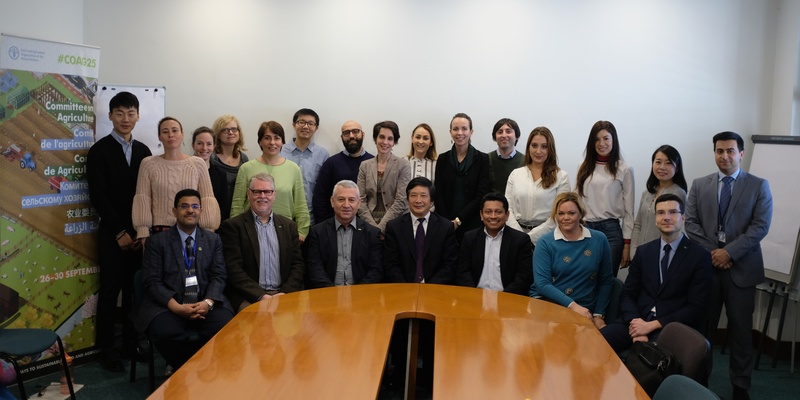2018 Annual Meeting of the IPPC Secretariat Held in Rome Italy
Posted on Mié, 24 Ene 2018, 10:20

The 2018 annual meeting of the IPPC Secretariat was held on 18 January at the FAO HQs in Rome, Italy, with the annual theme set as Optimization of Financial Management. The main objectives of the meeting were to review the major achievements of the IPPC Secretariat for 2017, as well as to plan the core activities and the annual theme of the IPPC Secretariat for 2018. The meeting was chaired by Mr. Jingyuan Xia, the IPPC Secretary and attended by all Secretariat staff. Mr. Xia opened the meeting with warm welcome of Mr. Avetik Nersisyan, the newly-appointed SSU Leader and Ms Sandra Goritschnig, the new Standard Setting Unit Associate. Team Leaders Mr. Brent Larson (SSU), Mr. Orlando Sosa (IFU), and Mr. Shoki AlDobai (IST), made briefings on their respective team achievements for 2017 and planning for 2018. Other presentations were delivered on the progress report of Task Force for the Resource Mobilization (TFRM) by Mr. Marko Benovic, on the major achievements of ePhyto project by Ms. Laura Vicaria Lopez, and on the overview of the Standardized items for IPPC Communication and Advocacy by Mr. Mirko Montuori. All staff actively shared their views and provided valuable suggestions on improvement of the IPPC Secretariat s work and performance.
The IPPC Secretary, Mr. Xia concluded the meeting by the highlighting the following three important points:
1. Major Achievements for 2017. 2017 marked a milestone in IPPC s history, with the 65th anniversary of the Convention, and the implementation of the annual theme on Plant Health and Trade Facilitation. Ten outstanding achievements for the IPPC Secretariat in 2017 were highlighted amongst many others:
1) The IPPC annual theme on Plant Health and Trade Facilitation was promoted through organizing a series activities, including one Key-note on the annual theme, one special topic session on eCommerce and one side event on ePhyto during the CPM-12; as well as one IPPC seminar on Plant Health and Trade Facilitation, and one on Plant Health Standards and Trade Facilitation.
2) The IPPC Governing Bodies meetings were successfully organized that includes: the CPM-12, three FC meetings, four Bureau meetings, two SC meetings, one CDC meeting, one IC meeting, and one SPG meeting. The new oversight body for implementation (IC), and a focus group on the joint call for Phytosanitary Measures were established based on the CPM and Bureau s decision.
3) A record number of standards were adopted (22), including five ISPMs, ten PTs and seven DPs; five TP meetings was organized (TPDP, TPPT, TPG, and 2 EWGs); and two consultations were conducted, one on 13 draft ISPMs, and one on three draft Specifications.
4) Standards implementation was strengthened by implementing the PCE in 10 countries (Barbados, Botswana, Georgia, Guinea, Kenya, Uzbekistan, Madagascar, Namibia, Somalia and Zambia); by conducting the pilot programme on surveillance of the three target pests; and by carrying out the IPPC project on Capacity Development supported by FAO-China SSC Programme.
5) IPPC Trade facilitation was promoted by finalizing the requirements for deployment of the IPPC ePhyto hub and the generic ePhyto national system (GeNS); by establishing the IPPC Sea Containers Task Force (SCTF) with its first meeting held in Shanghai, China; and by initializing the IPPC work on eCommerce.
6) Communication and Advocacy were promoted through the release of over 140 news, with 30% increase compared to 2016 and the increased IPPC presence on social media platforms (Facebook, Twitter, LinkedIn, Weibo). The IPPC Secretariat has published the 2016 IPPC Annual Report, four IPPC factsheets, two brochures, and other advocacy materials. Two receptions were organized to celebrate the IPPC 65th anniversary at the CPM-12 in Republic of Korea, and during the SPG meeting in Rome.
7) The International Year of Plant Health (IYPH) initiative was endorsed at the 40th Session of FAO Conference. Two IYPH Steering Committee meetings were organized, and one reception on promotion of the IYPH held at FAO HQs.
8) IPPC Network was promoted by organizing seven IPPC Regional Workshops (206 participants from 117 countries) one IPPC Workshop on NRO in Pacific region (29 participants from 21 NPPOs). The international cooperation was enhanced by signing the Joint Work Programme with CBD, and developing an Agreement with WCO for bilateral cooperation.
9) Resource mobilization was greatly strengthened with the IPPC Multi-Donor Trust Fund, the IPPC projects and the IPPC in-kind contributions all increased substantially compared to 2016.
10) The internal management was also strengthened by: i) standardizing 16 items for IPPC communication and advocacy, ii) improving the IPPC work plan and budget on a biannual basis, and iii) promoting team the teamwork and team spirit through the renewed task forces on resource mobilization and on communication and advocacy.
2. Key Activities for 2018. Among many tasks and activities for 2018, there are eight key activities, including: 1) Implementing the annual theme on Plant Health and Environmental Protection; 2) Supporting IPPC governance activities; 3) Strengthening standards setting and implementation; 4) Enhancing IPPC Trade Facilitation; 5) Promoting communication and advocacy; 6) Promoting development of IYPH 2020; 7) Enhancing IPPC network and international cooperation; and 8) Strengthening internal management.
3. Optimization of financial management. The theme of the IPPC Secretariat for 2018 is set as Optimization of Financial Management with the purpose to increase the transparency, accuracy and efficiency of the use of financial resources. To achieve this goal, a focus will be given to enforce better planning, monitoring and evaluating mechanism; and better control and management of all important activities (i.e. duty travel, contracts, procurement, etc.).
The IPPC Secretary stressed the importance of 2018 as the IPPC year of Plant Health and Environmental Protection towards IYPH 2020. He also reminded that the action plan for the Enhancement Evaluation to the IPPC Secretariat will be continuously implemented. He urged all staff of the IPPC Secretariat to work together with the whole IPPC community for achieving its mission to protect the world s plant resources from pests.



